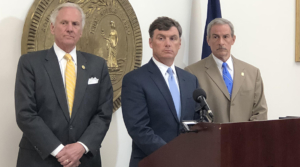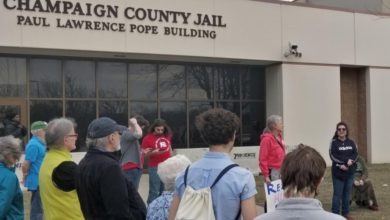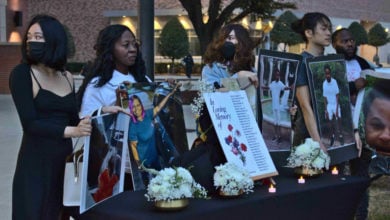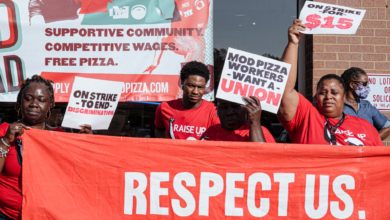
On January 8, members of the Party For Socialism and Liberation secured a meeting with Bryan Sterling, the director of the South Carolina Department of Corrections, along with Nena Walker-Staley and Wayne McCabe. This meeting came as the result of the months of struggle before, during and after the National Prison Strike of 2018. SCDC officials have not only refused to meet the demands of the strike, but have refused to address any of its concerns as well. The most basic assertion of human rights by incarcerated people has at best been consistently ignored, and at worst been responded to with the most egregious forms of abuse and collective punishment.
The fact that this meeting took place shows that the heroic fight back of those incarcerated in the national prison strike has created a situation where SCDC has no other choice but to address publicly, for the first time, the grievances and demands of incarcerated people inside their facilities. In doing so, Bryan Sterling and the Department of Corrections have exposed their own role in maintaining the brutal conditions inside South Carolina’s prisons.
What follows are the questions asked at the meeting in full, drafted with the help of many incarcerated workers throughout the state who participated in the strike, together with SCDC’s response.
Prisoners are complaining that your system is punishing mass groups of prisoners for only a few prisoners. This is known as collective punishment. Will your officers start to hold individuals accountable for their behavior?
Sterling replied that collective punishment is only used when they “can’t identify the individuals,” and stated that lockdowns are implemented for things like cigarettes and alcohol for two weeks or more. He further commented that lockdowns “cool everybody down and prevent fights” and that they are “necessary for our safety” given their staffing levels.
It is unreasonable that two-week lockdowns occur for inconsequential offenses such as the possession of cigarettes or alcohol. It is even more unreasonable to put everyone on lockdown for something that can hardly be considered an “offense.” Low staffing levels resulting in lockdowns are a sign of negligence on the part of SCDC, and incarcerated people should not be punished for their failings.
Prisoners are complaining about the lack of fruit on the regular lines. Are there plans to add fruit to the food menus?
Sterling responded by pointing out that in the past prisoners have made alcohol from the fruit served on SCDC lines, stating, “The Food Service Branch has been attempting to incorporate seasonal fresh fruit into the SCDC Master Menu for over a decade. Each time fruit has been added, Executive Staff (DDO, Regional Directors, Security, Wardens) report significant increase with issues in the institutions because of the inmate’s production of “Home-Made Alcoholic Beverages.””
This is a red herring. The fact that some inmates have made alcohol out of fruit does not negate all prisoners’ rights to a healthy, balanced and nutritious diet.
Despite supposed food guidelines, prisoners are denied adequate nutritious food. It is not unusual for some states and localities, for example Alabama, to spend less than two dollars a day on an inmate’s food. Food guidelines vary from place to place with each state government maintaining their own guidelines. The only real oversight comes from prisoners themselves who file lawsuits and complaints regarding food services.
It is clear that nutrition is treated by authorities as simply a cost issue, not a basic right.
Prisoners are complaining about the classification system not being incentive driven. Those at the bottom say once they leave a level 3 for a 2, it’s virtually the same. You notice no changes. Are there plans to make advancement seem more appealing?
Here Sterling acknowledged the failings of the classification system, stating that there should be a “systematic decrease in supervision and increase in privileges when inmates advance in security level,” but offered very little in the way of actual measures being taken to correct the current situation.
With regard to mental health in the classification system, Sterling lamented the underfunding and mishandling of mental health services and classification inside SCDC facilities. This was little more than lip service. Sterling gave an anecdote about routinely asking SCDC employees, “Would you trust your daughter around a formerly incarcerated person who has all these issues?” highlighting the particularly dehumanizing rhetoric that is commonplace in SCDC’s handling of mental health.
Currently prisoners are not allowed assignment to the education buildings to study for their GED if they can’t read, write, or score a certain level. Are there plans to make education more accessible to these individuals? Prisoners are also saying the spike in violence came when younger prisoners (21-26) were forced to remain in the units due to no school programs.
To this Sterling responded by saying that SCDC “does currently allow assignment to the Education Building for inmates to study to take the GED test. Adult offenders must voluntarily sign up to begin the GED process and are allowed based on eligibility and availability. Younger straight time inmates who are legally of school age (under 21 years of age) and all inmates sentenced under the Youthful Offender Act (YOAS) who have not earned a high school diploma or GED will be required to attend appropriate educational classes.”
Those incarcerated under 21 are required to get an education; which is a basic human right. Therefore all individuals incarcerated should have mandatory time carved out for going to school and receiving their GED and pursuing higher education if they so choose. The men and women who are imprisoned and who cannot read or write are not allowed to study– which means SCDC is blatantly denying these individuals a human right and necessity.
Prisons profit off of each inmate, so when a person is released without obtaining any type of education; that reduces employment opportunities which causes 60 percent to return to prison. This cycle keeps the prison industrial complex afloat. Sterling and his team commented that “we can’t force grown men to go to school”. This is directly a contradiction of the demands set forth during the 2018 prison strike, the ninth of which was for incarcerated men and women to have higher learning opportunities such as college level universities, technical, state, and community college enrollments readily available via pell grants to aid the rehabilitation of all who desire.
Prisoners want to know are you all coming up with a safe strategy for prisoners that want to leave gangs. Currently they are beat or stabbed out of gangs. So they stay in because they have no out.
Sterling replied by stating that while “Police Services has revised Security Threat Group Policy and it is currently being reviewed,” it was a “restricted policy” which could not be discussed.
This is an obvious dodge of a direct question. Sterling and his team have not made any steps in reducing gang violence. When making the suggestion of former gang leaders speaking with or mentoring those incarcerated, they also did not acknowledge the importance of addressing the outside conditions that draw Black and Brown youth into gangs. They also seemed be unable to make the connection of separating those that have left gangs from the people that are still affiliated with gangs that could cause harm to those wanting to leave.
Are you training your officers to respond to riots better? Lee county prisoners were left in there for hours. Many bled to death. This was similar to what happen at Lieber Correctional when prisoners were left all night.
Sterling and his team’s response to this was particularly telling, stating that “SCDC staff are trained in responding to emergency situations on an annual basis. It is a basic tenet of first responders to emergency situations not to enter if it is not safe. Our staff are greatly outnumbered, in many cases there is only one (1) officer to 256 inmates; staff safety is priority.”
This is a familiar story for America’s poor and oppressed communities. Any time oppressed people have made their discontent with the present state of neglect and abuse known, the centers of power have always responded by retreating to a position where they themselves are made out to be a victim. For example, when police terrorize poor and oppressed communities around the country, the heavily armed, heavily funded and well trained police forces are portrayed as being somehow defenseless against those same “dangerous” communities. This same logic is present here.
By their own admission, annual training wasn’t enough to prevent the worst incident of violence in a U.S. prison in over a quarter of a century. SCDC may be willing to hold the human rights of incarcerated people hostage until they can straighten out their own incompetence, but the reality is that it can’t wait.
Prisoners are complaining of racial and religious bias when it comes to legal name changes. Their legal names are written small on IDs and not noted on prison roll calls. Instead they are forced to pronounce their (committed) old names. Even the kiosk and jpay system do not have their legal names. So families and friends are forced to acknowledge the prisoners’ old names. Can you change this to make these cultural and religious legal name changes recognized? Your current policy says they are to be recognized on all SCDC forms, but this is not the case.
When asked why those incarcerated are still called by their committed (old names) Sterling and his team responded that it would be too time consuming and essentially too confusing to do otherwise. When asked if trans and non-binary individuals were still called by their “dead names,” Staley commented that it was like “comparing apples to oranges” and that all trans inmates are referred to by their specified names.
When it was pointed out that actually verbalising legal names and making those names the only ones visible on IDs would stop the confusion, they responded that the reasoning for not doing so is that too much information would have to be waded through and basically that it would be too much work.
A person changing their name is a way of shedding their old identity and often times harmful ways. Incarcerated people being able to freely change their name can often play a vital role in the rehabilitation process. The fact that SCDC finds this to be “too confusing” or “too much work” plainly tears apart the image we’re constantly being fed of the prisons as centers of rehabilitation and reformation.
A law was recently passed to allow prisoners to attend funerals. Recently prisoners are finding out that SCDC is automatically blocking violent offenders from attending contrary to law. Are you aware of this? Why is it necessary that all violent offenders be blocked from this benefit afforded by law?
Sterling replied that “inmates will be transported to death bed/funeral visits provided they meet certain criteria,” but provided no indication as to what that “certain criteria” may be. His open ended answer here can really be taken as a non-answer altogether.
Currently prisoners are not given any incentive pay for their jobs, are there any plans to bring back state pay where they give prisoners a few dollars once every two weeks? They had this once years ago but took it away, this too caused a spike in violence.
Sterling brushed this off by stating that he didn’t know whether there was a plan, and that he hadn’t seen anything to “prove the correlation between inmate pay and a spike in institutional violence,” despite this being part of a long standing demand of the prison strike.
It is not hard to see how the conditions of desperation, humiliation and misery inside the prisons can intensify the divisions already there. Prisoners are forced to work for cents a day, competing with others for extra crumbs, all while scrambling to find ways to meet their basic needs that SCDC refuses to provide for. The fact of the matter is that SCDC has an interest in maintaining these divisions, even if increased violence is the cost.
Lockers were taken from some prison yards a few months ago. Prisoners having no lockers to secure property is causing a spike in robberies. Prisoners that have nothing are able to identify what a prisoner has and make plans to take it. Further, at a minimum prisoners should be allowed to place their property on shelves. Currently all property is on the floors for rats, bugs, and flooded cells.
Sterling responded with another misleading excuse, claiming that the lockers were removed because of the threat of prisoners “using the metal from the lockers as weapons against staff.” He stated that prisoners were given duffel bags for their belongings, but many have have reported that this only intensified the situation due to their extremely limited supply.
How many deaths has there been in 2018 that they have labeled natural cause? And how many labeled suicide? (By age bracket)…..
Sterling revealed that in 2018, SCDC reported that there were 11 deaths declared suicides, 63 declared natural causes, and 12 with no official cause of death yet determined.
Any deaths from suicide are too many deaths. Even outside of prisons suicides are often marked down as “accidental deaths” and, it seems likely that this could be the case here as well. Aside from the deaths from suicide, SCDC reported a tragic amount of deaths marked as having been from “natural causes” at abnormally young ages, indicating a much lower life expectancy for incarcerated people.
How do the ‘mass-lockdowns’ implemented on whole dorms and yards based on isolated situations further the State’s interest in providing the prisoner population with the “…humane treatment, and be given opportunity, encouragement and training in the matter of reformation” as mandated by S.C. Code Ann. §24-1-20? And if he determines that the ‘mass-lockdowns’ were implemented (without his knowing) through an abuse of the discretion given to each SCDC Institution’s Warden, will he publicly announce his prosecution of those Wardens under S.C. Code Ann. §24-1-210?
Sterling responded that “SCDC has continued to implement institutional lockdowns at specific institutions since the incident at Lee to ensure that no retaliatory incidents take place” and added that they have a plan to “return these institutions to ‘normal’ operations, however, we are moving forward with an abundance of caution.”
These sort of indefinite lockdowns are nothing new for South Carolina prisons, however, they have greatly intensified after the killings at Lee Correctional, and especially after the national prison strike.
These mass lockdowns in which prisoners are locked in cells for extensive amounts of time, subject to an increased amount of invasive searches and arbitrary confiscation of belongings, as well as being severely restricted in their freedom of movement altogether, are doing anything but preventing violence. If anything, these lockdowns themselves are violent and perpetuate violence.
The fact that, according to Sterling, these lockdowns are the only thing preventing the situation in these facilities from breaking out into unhinged violence like the incident at Lee signals a much deeper problem that no amount of “law and order” tactics could mask.
Prisoners are complaining about metal covering windows, which does not allow sunlight to enter into cells-why is this and will this be rectified?
Sterling replied by claiming that, “the metal window coverings were installed to prevent innates from coordinating throw overs” and also added, “it should be noted that many inmates choose to cover their windows and doors to conceal their illegal activities.”
This is yet another obvious ploy on the part of SCDC to distract from an underlying problem. Even if we were to believe this were somehow a rational response to a real problem, the much more pressing threat comes from within SCDC itself. Corrections Department employees are constantly being implicated for their role in illegal smuggling and gang activity. Just a week after the killings at Lee Correctional which are so often used as a justification for these types of egregious measures, 14 South Carolina Department of Corrections officers were indicted on federal charges of bribery, wire fraud conspiracy and possession with intent to distribute drugs. It’s clear that to Sterling and his team, stopping illegal activities is a conditional problem depending on who is carrying them out.
Read SCDC’s written handout given at the meeting in full here





